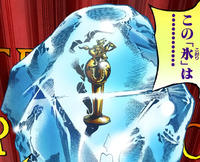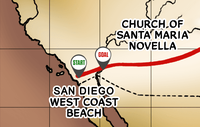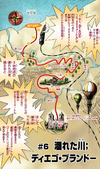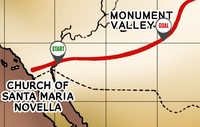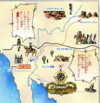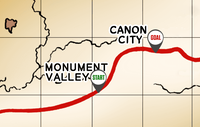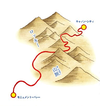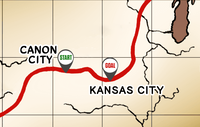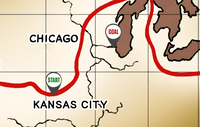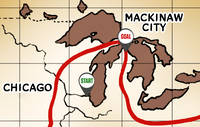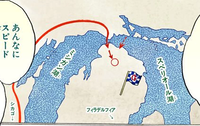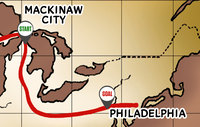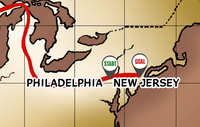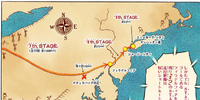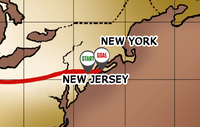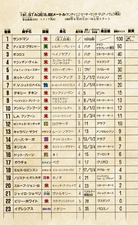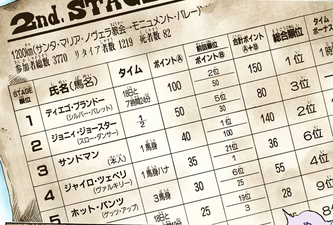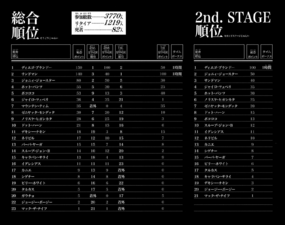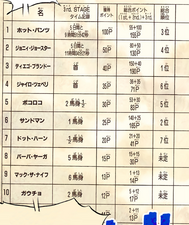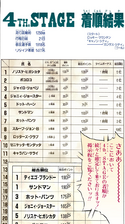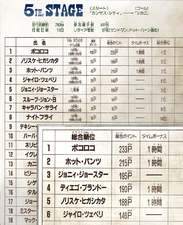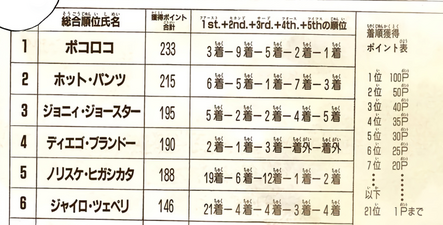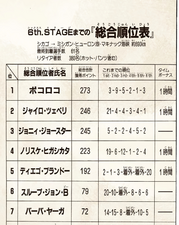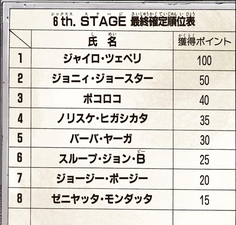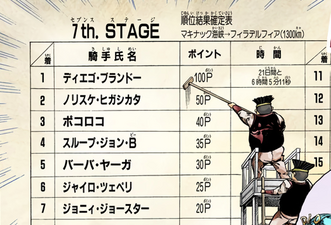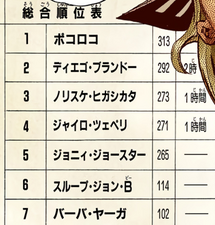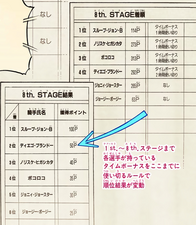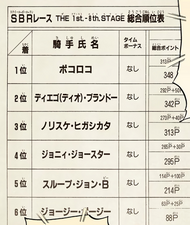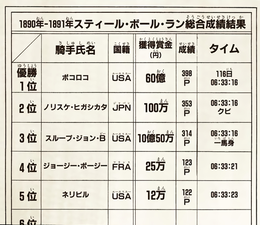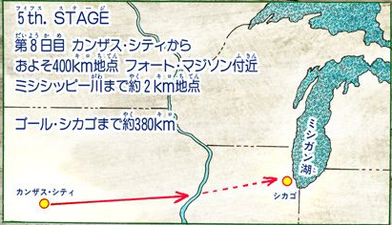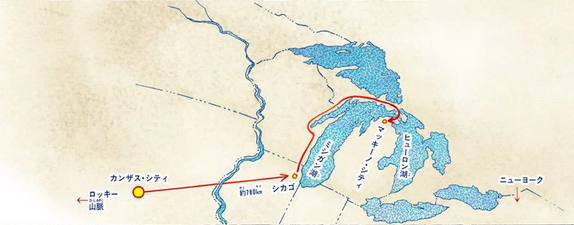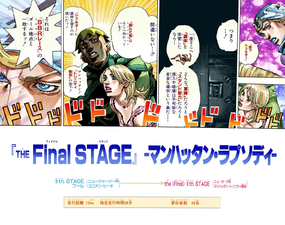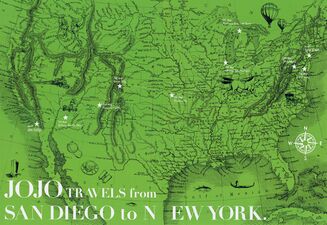Steel Ball Run
The Steel Ball Run (スティールボールラン, Sutīru Bōru Ran) is a race consisting of a series of checkpoints and routes on a rough course approximately 6,000 km (3,700 mi) long that runs from San Diego to New York City, USA. The race drives the plot of Steel Ball Run, which is named after this event.
Summary
The Steel Ball Run is hosted by Steven Steel. As an open invitation to adventurers, the rules of the race permit competitors to use horses, camels, newly-invented automobiles, and even their own two feet, as long as they use the same method of transportation across the entire race. Different kinds of hazards and climates await, from the dryness of the Arizona desert to the harsh cold and unstable terrain of a frozen Lake Michigan strait.
The race's estimated completion time is 60 to 80 days. Participants must be at least 16 years old and there is a necessary participation fee of $1200 per person with no refunds. All expenses of the participants such as travel, medical, food, and hotel costs are covered. Participants are also permitted to carry weapons as long as they are not used for criminal behavior.[1]
Sponsors
The news company, East and West Tribune, has exclusive coverage of the race. Other sponsors include publishing companies, hotel groups such as the San Diego Beach Hotel, B&C Meat Packaging Corporation, Winchester Firearm Production, Horizontal Continental Railroad Corporation, and the Speedwagon Oil Company.[1]
The president of the United States, Funny Valentine, is backing the race as well and provides Steven with most of its funding.[2]
Prizes
At the end of each stage, points are awarded based on the racer's placement, following this table:[3][4]
| Placement | Points | Placement | Points |
|---|---|---|---|
| 1st | 100 | 12th | 10 |
| 2nd | 50 | 13th | 9 |
| 3rd | 40 | 14th | 8 |
| 4th | 35 | 15th | 7 |
| 5th | 30 | 16th | 6 |
| 6th | 25 | 17th | 5 |
| 7th | 20 | 18th | 4 |
| 8th | 15 | 19th | 3 |
| 9th | 13 | 20th | 2 |
| 10th | 12 | 21st | 1 |
| 11th | 11 | Unplaced | 0 |
The competitor who completes the race with the most points is declared the winner and receives the grand prize of 50 million dollars (6 billion yen). The racers who finish in second, third, fourth, and fifth place receive ¥1,000,000 ($8,333), ¥500,000 ($4,166), ¥250,000 ($2,083), and ¥120,000 ($1,000) respectively.[a] Special prizes up to tenth place such as the checkpoint award are also available. Participants who finish first in each stage receive a one-hour time bonus along with an additional $10,000 (¥1,200,000).[5]
There are extra prizes for the overall winner from the sponsors, including the Transcontinental Railroad Stockholder Award, the Horizon Newspaper Award, the North American Horse Owner Association Award, the Selective Breeding Vegetable Company Award, and the Communication Catalog Sales Award.[6]
Championship Trophy
The championship trophy of the Steel Ball Run is placed inside a block of ice from the South Pole. According to scientists, the ice froze over 300 million years ago. The trophy is transported to the goal in New York via railroad and the ice is calculated to melt by the time the race finishes.
The trophy itself is golden and resembles the logo of the race, with a horseshoe symbol on the center of a sphere. On top of the sphere is a jockey with long hair and a hat riding a horse.[7]
History
The concept of the Steel Ball Run was conceived by Steven Steel and a young Lucy Pendleton at some point around 1888. Listening to Steven's ramblings about organizing a long distance horse ride, Lucy proposed that Steven make it a race across America instead with an enormous prize. Steven first found the idea ridiculous, but talked about it at a bar anyway, which caught the attention of numerous sponsors ready to gamble on such huge event.[8] Around 1889, the president of the United States met Steven and became a backer for the race, structuring the race's route around a map created by Joseph of Arimathea and secretly turning the event into a front for the search for the Saint Corpse Parts.[4]
The race takes place in the USA, starting September 25, 1890 at 10 A.M. on San Diego Beach and concluding at the final finish line in front of New York City's Trinity Church. The total distance covered is estimated at around 6,000 km (3,700 mi), which is divided into nine stages separated by known landmarks. In cases where the stage's order of arrival is not clear, five judges are able to examine a photograph of the racers as they cross the finish line in order to determine their placement.[3]
The race concludes on January 19, 1891, with Pocoloco declared the winner on account of Diego Brando's unexplained disappearance. Out of 3,652 initial competitors, only 39 manage to complete the entire race. The race ultimately produces 50 billion dollars (7 trillion yen) in total profit. Although the race is initially heavily criticized for being inhumane due to the deaths of numerous competitors, the news that Steven Steel had donated everything he earned from the race to various causes satisfies most of the dissent.[9]
Route and Stage Results
Total Distance: 15,000 m (9.3 mi)
Participants: 3852
Retired: 79
Deaths: 3
1st. STAGE
15,000 Meters (15,000メートル)
San Diego Beach[5] to Santa Maria Novella Church[3]
(SBR Chapter 5 - SBR Chapter 12)
The first stage is the second-shortest stage of the Steel Ball Run. However, it is also a high-intensity stage with a wide variety of terrain that serves as an exciting introduction to the race. The entire stage is set parallel to train tracks so that journalists and VIPs can follow and report on the first stage from the comfort of a train car. The open and flat ground of the San Diego Beach starting line was chosen to accommodate the thousands of participants. The first kilometers of the stage take place over relatively-forgiving open terrain, with no notable obstacles besides a few cacti, trees, crevices. At the three kilometer point, there is a bridge over a dried-up river.[10]
The path then becomes a winding uphill with a rise of about 50 meters. There's a swerve around a large rock formation where racers can choose to take a shortcut at the tip of the formation through a forest and run the risk of bumping into trees; taking this shortcut saves an hour compared to the standard route. The shortcut rejoins the main path at the six kilometer point.[11] A downhill slope starts here, where riders are expected to reduce and control the pace of their horses to avoid tripping. After passing an abandoned farm, the racers sprint toward the finish line over 2,000 m (1.2 mi) of flat terrain.[10]
Total Distance: 1,200 km (750 mi)
Participants: 3770
Retired: 1219
Deaths: 82
2nd. STAGE
Across the Arizona Desert (アリゾナ砂漠越え)
Santa Maria Novella Church[12] to Monument Valley[12]
(SBR Chapter 13 - SBR Chapter 28)
The second stage is one of the longest and harshest of the race. The riders must cross around 1,200 km (750 mi) of desert in a hot and dry climate, which puts the competitors and their horses at risk of dying from thirst, heat, or hostile fauna. To guarantee the safety of the racers, covered wagons filled with medics and referees follow the race from a distance; competitors can ask the medics for food, water, or medicine, but will immediately be retired from the race if they choose to do so.[12]
In addition to the regular dangers of the desert, racers also risk becoming lost due to the influence of a Devil's Palm. Out of 1219 retirees in this stage, 523 drop out due to interference from the Devil's Palm. The desert terrain is relatively rough, as the desert is marked by several mountainous areas and rocky formations. There is a control point halfway through the stage before the riders enter the relatively-open terrain near the goal at Monument Valley.[2]
Total Distance: 510 km (320 mi)
Participants: 2469
Retired: 551
Deaths: 0
3rd. STAGE
Rocky Mountain Breakdown
(ロッキ・マウンテン・ブレイク・ダウン)
Monument Valley[14] to Cañon City[14]
(SBR Chapter 28 - SBR Chapter 32)
The third stage consists of a 510 km (320 mi) race through the Rocky Mountains. The riders must travel across the rocky terrain of the mountains while avoiding hostile fauna such as cougars. Near the end of the stage, there is a small village along the path where competitors can take a short rest.[14]
The final 5 km (3.1 mi) of the stage see the remaining competitors travel downhill from the mountains and around a lake 450 m (0.28 mi) across. Racers who go around the lake's right side travel a flat 2,400 km (1,500 mi) route, while those who choose the left side face a treacherous 1,700 m (1.1 mi) path across the side of a cliff. Cañon City, the stage's goal, lies on the other side of the lake.[15]
The results of jockeys whose names are italicized were determined by extrapolating the results from the tables of all stages.
Total Distance: 1,250 km (780 mi)
Participants: 1918
Retired: 1476
Deaths: 1
4th. STAGE
Little Tomb on the Wide, Wide Prairie
(広い広い大草原の小さな墓標)
Cañon City[20] to Kansas City[20]
(SBR Chapter 33 - SBR Chapter 40)
At 1,250 km (780 mi) in length, the fourth stage is one of the longest stages of the race. As it takes place in the Great Plains, the stage's terrain mostly consists of open fields with the occasional forest. Ultimately, this stage is more focused on endurance than speed, as racing at top speed can cause racers to trip over small bumps in the ground.[21]
The results of jockeys whose names are italicized were determined by extrapolating the results from the tables of all stages.
Total Distance: 780 km (480 mi)
Participants: 441
Retired: 65[25]
Deaths: 2
5th. STAGE
Illinois Skyline (イリノイ・スカイライン)
Kansas City[20] to Chicago[26]
(SBR Chapter 40 - SBR Chapter 45)
Continuing across the rest of the Great Plains, the fifth stage's terrain is very similar to the fourth's, with most of the route crossing open fields and the occasional farm. Approximately 378 km (235 mi) before the goal, the Mississippi River serves as an obstacle which racers must figure out how to traverse. Though horses are capable of swimming across rivers by themselves, entering the water leaves them and their riders open to attack from other racers, flies, mosquitos, and even snakes swimming in the water.[27][28]
The results of jockeys whose names are italicized were determined by extrapolating the results from the tables of all stages.
Total Distance: 690 km (430 mi)
Participants: 374
Retired: 313
Deaths: 0
6th. STAGE
Michigan Lakeline (ミシガン・レイクライン)
Chicago[26] to Mackinaw City[26]
(SBR Chapter 45 - SBR Chapter 55)
Being the northernmost stage of the race, this stage primarily takes place in the cold and snowy tundra of Wisconsin. The main obstacles that racers face during the majority of this stage are the cold climate and hostile fauna such as wolves. The snow may also conceal crevices in the ground, which may endanger racers moving at high speeds. The most dangerous section of this stage comes 15 km (9.3 mi) before reaching the goal, as racers must cross the strait between Lake Michigan and Lake Huron on uncertain ice.[30]
The results of jockeys whose names are italicized were determined by extrapolating the results from the tables of all stages.
Total Distance: ~1,300 km (810 mi)
Participants: 61
Retired: 9
Deaths: 0
7th. STAGE
Philadelphia Triangle
(フィラデルフィア・トライアングル)
Mackinaw City[26] to Philadelphia[28]
(SBR Chapter 56 - SBR Chapter 60)
The seventh and longest stage of the Steel Ball Run sees racers travel southeast toward Philadelphia's historic Benjamin Franklin Parkway, swerving around Lake Erie in the process. The terrain bears a similarity to the plains found in the fourth and fifth stages, though the stage's route passes through more civilized areas than prior stages.[32]
The results of jockeys whose names are italicized were determined by extrapolating the results from the tables of all stages.
Total Distance: 140 km (87 mi)
Participants: 52
Retired: 6
Deaths: 1
8th. STAGE
Both Sides Now (ボース・サイド・ナウ)
Philadelphia[28] to Union Beach[33]
(SBR Chapter 60 - SBR Chapter 91)
The eighth stage's course sees the remaining participants travel across the fields of New Jersey. Racers traveling near the coastline may have to watch out for distortions in space, but otherwise the stage is fairly short and straightforward. At the end of the stage, each contestant boards a waiting boat in order to cross Raritan Bay and reach the final stage, where they are scheduled to disembark in 15-second intervals. All time bonuses are applied at the end of this stage.[34]
The results of jockeys whose names are italicized were determined by extrapolating the results from the tables of all stages.
Total Distance: 13,000 m (8.1 mi)
Participants: 45
Retired: 6
Deaths: 0
The Final STAGE
Manhattan Rhapsody (マンハッタン・ラプソディ)
Union Beach[33] to Trinity Church[33]
(SBR Chapter 91 - SBR Chapter 94)
The final stage of the Steel Ball Run doubles as the shortest stage of the race. Disembarking from their escort boats one-by-one, racers must travel north from Coney Island to Manhattan. After crossing the Brooklyn Bridge, the finish line in front of Trinity Church is only a short distance away.[33]
The final stage also has a special exclusive prize bonus of one billion yen ($8,333,333)[a] for the racer who places first in the stage results.[34]
Participant Data
| Jockey (Name and #) |
Age | Country | Horse's Name | Age | Species | 1st | 2nd | 3rd | 4th | 5th | 6th | 7th | 8th | 9th | Overall | Points |
|---|---|---|---|---|---|---|---|---|---|---|---|---|---|---|---|---|
| Completed | ||||||||||||||||
A-777 |
21 | USA |
4 | Quarter Horse | 3 | 9 | 5 | 2 | 1 | 3 | 3 | 4 | 2 | 1st | 398 | |
| 68 | Japan |
4 | Bavarian Warm Blood | 19 | 6 | 12 | 1 | 2 | 4 | 2 | 3 | 3 | 2nd | 353 | ||
| ? | USA |
4 | Quarter Horse | 20 | 10 | Out | 8 | 6 | 6 | 4 | 1 | 1 | 3rd | 314 | ||
| ? | France |
? | ? | ? | Out | 20 | 11 | 12 | 17 | 7 | 8 | 6 | 4 | 4th | 123 | |
| ? | USA |
4 | Quarter Horse | 15 | 12 | 13 | 13 | 11 | 9 | 9 | 7 | 5 | 5th | 122 | ||
| Drop Outs | ||||||||||||||||
01 |
20 | UK |
4 | Arab Thoroughbred | 2 | 1 | 3 | 54 | Out | 20 | 1 | 2 | Disqualified | 342 | ||
939 |
19 | USA |
11 | Appaloosa | 5 | 2 | 2 | 4 | 5 | 2 | 7 | 5 | Retired | 295 | ||
B-636 |
24 | Kingdom of Naples |
4 | Stock Horse | 21 | 4 | 4 | 3 | 4 | 1 | 6 | Dead | 246 | |||
| ? | Russia |
5 | Arab | 14 | 15 | 8 | Out | 10 | 5 | 5 | Retired | 102 | ||||
| 23 | USA |
3 | Mustang | 6 | 5 | 1 | 7 | 3 | Retired | Dead | 215 | |||||
| 18 | USA |
None | 1 | 3 | 6 | 6 | Dead | 190 | ||||||||
| ? | Mongolia |
4 | Boulonnais | 16 | 8 | 7 | 5 | Dead | 71 | |||||||
| ? | Mexico |
6 | Criollo | 17 | Out | 10 | Dead | 17 | ||||||||
| 31 | USA |
5 | Mustang | 4 | Retired | Dead | 35 | |||||||||
| ? | Germany |
4 | Trakehner | 7 | Retired | 20 | ||||||||||
C-449 |
? | USA |
4 | Quarter Horse | 9 | Dead | 13 | |||||||||
C-450 |
? | USA |
3 | Quarter Horse | 10 | Retired | 12 | |||||||||
C-451 |
? | USA |
3 | Quarter Horse | 11 | Retired | 11 | |||||||||
215 |
? | Mexico |
7 | Appaloosa | 18 | Retired | 4 | |||||||||
242 |
? | Kingdom of Naples |
? | ? | ? | Out | Retired | 0 | ||||||||
017 |
? | Egypt |
? | Camel | Retired | 0 | ||||||||||
| ? | Germany |
Automobile |
Retired | 0 | ||||||||||||
| ? | ? | ? | ? | ? | Dead | 0 | ||||||||||
| ? | ? | ? | ? | ? | Dead | 0 | ||||||||||
| ? | ? | ? | ? | ? | Dead | 0 | ||||||||||
| Unknown | ||||||||||||||||
| Zenyatta Mondatta | ? | India |
Roxanne | 5 | Arab | 12 | 7 | ? | 10 | ? | 8 | ? | ? | ? | ? | 57+ |
| Caravan Serai | ? | Mexico |
Moon Flower | 4 | Andalusian | 13 | 18 | 14 | 11 | 7 | ? | ? | ? | ? | ? | 52+ |
| Dixie Chicken | ? | USA |
Ramblin' Man | 4 | Pinto | 8 | 19 | ? | ? | 9 | ? | ? | ? | ? | ? | 31+ |
| Nightfly | ? | ? | ? | ? | ? | Out | Out | ? | ? | 8 | ? | ? | ? | ? | ? | 25+ |
| Iglesias | ? | Portugal |
Natalie | 5 | Palomino | 23 | 11 | ? | ? | 12 | ? | ? | ? | ? | ? | 21+ |
| Kanye | ? | ? | ? | ? | ? | Out | 13 | ? | ? | 13 | ? | ? | ? | ? | ? | 18+ |
| Mack the Knife | ? | ? | ? | ? | ? | Out | 21 | 9 | ? | 19 | ? | ? | ? | ? | ? | 17+ |
| Shigechi | ? | ? | ? | ? | ? | Out | 14 | ? | ? | 15 | ? | ? | ? | ? | ? | 15+ |
| Billy White | ? | USA |
Love Unlimited | 5 | Mustang | 22 | 16 | ? | ? | 14 | ? | ? | ? | ? | ? | 14+ |
| Rotters Club | ? | ? | ? | ? | ? | Out | Out | ? | 9 | ? | ? | ? | ? | ? | ? | 13+ |
| Tarkus | ? | ? | ? | ? | ? | Out | 17 | ? | ? | 16 | ? | ? | ? | ? | ? | 11+ |
| Mister | ? | ? | ? | ? | ? | Out | Out | ? | ? | 18 | ? | ? | ? | ? | ? | 4+ |
Gallery
Trivia
- The grand cash prize of 50 million dollars is estimated with reference to modern values, and is not to be confused with what $50 million would be worth in 1890 (which would approximately equal to 1.5 billion USD as of 2021). Within the manga, the prize is said to be 6 billion yen.[37]
Notes
- ↑ 1.0 1.1 The prizes for the runner-ups are originally stated as dollar amounts in SBR Chapter 1, but the final results page in SBR Chapter 95 uses the same numbers as yen amounts. The corresponding dollar amounts for the yen prizes are calculated based on the conversion rate in SBR Chapter 1's tailpiece.
References
- ↑ 1.0 1.1 Steel Ball Run Chapter 1: The Steel Ball Run Press Conference
- ↑ 2.0 2.1 Steel Ball Run Chapter 25: Tusk, Part 1
- ↑ 3.0 3.1 3.2 Steel Ball Run Chapter 12: 1st Stage: Disqualified from Victory
- ↑ 4.0 4.1 Steel Ball Run Extra Chapter 2: The Story of F. Valentine
- ↑ 5.0 5.1 Steel Ball Run Chapter 5: 1st Stage: 15,000 Meters
- ↑ Steel Ball Run Chapter 94: The World of Stars and Stripes
- ↑ Steel Ball Run Chapter 4: September 25, 1890 - 3 Hours to Start
- ↑ Steel Ball Run Extra Chapter 1: ~How the Steel Ball Run Race Got Started~
- ↑ Steel Ball Run Chapter 95: The World of Stars and Stripes - Outro
- ↑ 10.0 10.1 Steel Ball Run Chapter 6: The Dried-Up River; Diego Brando
- ↑ Steel Ball Run Chapter 7: Pocoloco and Sandman
- ↑ 12.0 12.1 12.2 Steel Ball Run Chapter 13: The Sheriff's Request to Mountain Tim
- ↑ Steel Ball Run Chapter 28: Scary Monsters, Part 1; the second stage starts on September 26th at 10 AM, and Diego enters the third stage 18 days, 7 hours, and 24 minutes later.
- ↑ 14.0 14.1 14.2 Steel Ball Run Chapter 28: Scary Monsters, Part 1
- ↑ Steel Ball Run Chapter 32: 3rd Stage Goal: Cañon City
- ↑ 16.0 16.1 Steel Ball Run Chapter 57: Civil War, Part 2
- ↑ 17.0 17.1 17.2 17.3 17.4 17.5 17.6 17.7 17.8 17.9 Due to their 3rd stage placement being unknown
- ↑ 18.0 18.1 18.2 18.3 18.4 18.5 18.6 18.7 Since they are below Nellyville overall who has 25 points in the 5th stage, this is the range of points they can have in this stage based on the amount of points they gain in the 5th stage.
- ↑ Steel Ball Run Chapter 32: 3rd Stage Goal: Cañon City; Hot Pants enters the fourth stage 5 days, 9 hours, 51 minutes, and 41 seconds after entering the third.
- ↑ 20.0 20.1 20.2 Steel Ball Run Chapter 33: The World of Man, Part 1
- ↑ Steel Ball Run Chapter 38: Catch the Rainbow (On a Stormy Night...), Part 1
- ↑ 22.0 22.1 Due to their 3rd and 4th stage results being unknown
- ↑ Based on them getting 15 points in the 5th stage and having 25 overall
- ↑ Steel Ball Run Chapter 40: Silent Way, Part 1; Norisuke Higashikata enters the fifth stage 21 days, 7 hours, 10 minutes, and 13 seconds after entering the fourth.
- ↑ The manga states 67 but it includes Dot Han and Sandman
- ↑ 26.0 26.1 26.2 26.3 Steel Ball Run Chapter 40: Silent Way, Part 1
- ↑ Steel Ball Run Chapter 42: Silent Way, Part 3
- ↑ 28.0 28.1 28.2 Steel Ball Run Chapter 55: The Victor's Qualifications
- ↑ Steel Ball Run Chapter 45: The Promised Land: Sugar Mountain, Part 1; Pocoloco reaches the fifth stage's goal 14 days, 2 hours, 11 minutes, and 5 seconds after the fourth stage begins.
- ↑ Steel Ball Run Chapter 51: Wrecking Ball, Part 1
- ↑ 31.0 31.1 Steel Ball Run Chapter 60: Both Sides Now, Part 1; Gyro and Johnny finish the seventh stage at 3:51 PM on December 28th, 1890. They arrive roughly 45 minutes after Diego Brando, who finished the stage in 21 days, 8 hours, 5 minutes, and 11 seconds.
- ↑ Steel Ball Run Chapter 56: Civil War, Part 1
- ↑ 33.0 33.1 33.2 33.3 Steel Ball Run Chapter 90: High Voltage, Part 1
- ↑ 34.0 34.1 Steel Ball Run Chapter 91: High Voltage, Part 2
- ↑ 35.0 35.1 The results in the manga state that Georgie Porgie is in 6th place but this is an error based on Nellyville's final points in SBR Chapter 95.
- ↑ Steel Ball Run Chapter 90: High Voltage, Part 1; Timeline Inconsistencies
- ↑ Steel Ball Run Chapter 1: The Steel Ball Run Press Conference, About Numerical Values and Notation
